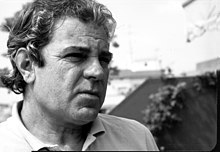Juan Marsé
You can help expand this article with text translated from the corresponding article in Spanish. (June 2018) Click [show] for important translation instructions.
|
Juan Marsé | |
|---|---|
 Juan Marsé in 1991 | |
| Born | Juan Faneca Roca 8 January 1933 |
| Died | 18 July 2020 (aged 87) Barcelona, Spain |
| Occupation(s) | Novelist, journalist and screenwriter |
| Movement | Generation of '50 |
| Signature | |
 | |
Juan Marsé Carbó (8 January 1933 – 18 July 2020) was a Spanish
Biography
Marsé was born Juan Faneca Roca in Barcelona. His mother died in childbirth, and he was soon adopted by the Marsé family, taking the name Juan Marsé Carbó.
At age 14, without finishing his studies, Marsé began to work as a jewelry apprentice. He spent some time working in the Barcelonès magazine 'Arcinema' and began his literary career in 1958 with some stories that appeared in 'Insula' and 'El Ciervo' magazines. His story, Nada para morir, won the Sésamo Prize, and in 1958 he published his first novel, Encerrados con un solo juguete (Locked up with a Single Toy), which was a finalist of the Biblioteca Breve Seix Barral Prize.
Afterwards, he spent two years in Paris working as "garçon de laboratoire" at the Pasteur Institute and translating screenplays and teaching Spanish. Back in Spain he wrote Esta cara de la luna (This Side of the Moon), repudiated and never included in his complete works. In 1965 he won the Biblioteca Breve Prize with Últimas tardes con Teresa (Last Evenings with Teresa).
He married Joaquina Hoyas and began working in
In 1974, he started a
He wrote two novels about post-war Barcelona, Un día volveré (One Day I'll Come Back) and Ronda del Guinardó, followed by the collection of short stories, Teniente Bravo.
In the 1990s, he received numerous prizes, including Ateneo de Sevilla Prize for El amante bilingüe (The Bilingual Lover)
MacLehose Press published The Calligraphy of Dreams in 2014.[4]
Marsé died on 18 July 2020.[5]
Film adaptations
- The Dark History of Cousin Montse (Jordi Cadena, 1977)
- Girl with the Golden Panties (Vicente Aranda, 1980)
- Last Evenings with Teresa (Gonzalo Herralde, 1984)
- If you say that I fell (Vicente Aranda, 1989)
- The Bilingual Lover (Vicente Aranda, 1993)
- Domenica - adapted from Ronda del Guinardó (Wilma Labate, 2001)
- The Shanghai Spell (Fernando Trueba, 2002)
- Lolita's Club(Vicente Aranda, 2007)
External links
References
- ^ Flood, Alison (28 November 2008). "Catalan novelist Juan Marsé wins the 'Spanish Nobel prize'". The Guardian. Retrieved 28 May 2012.
- ISSN 0362-4331. Retrieved 6 September 2020.
- ^ Deiser, Andrew J. “Competing Social Values in Juan Marsé's ‘EL AMANTE BILINGÜE.’” Hispanófila, no. 158 (2010): 67–81.
- ISBN 9781782064879.
- ^ Geli, Carles (19 July 2020). "Muere el escritor Juan Marsé" (in Spanish). El País. Retrieved 19 July 2020.

